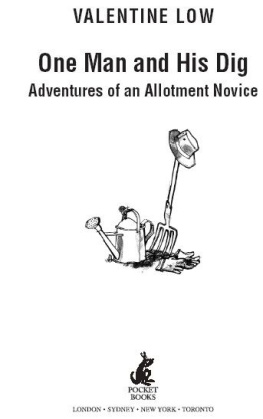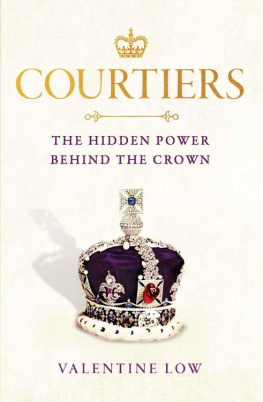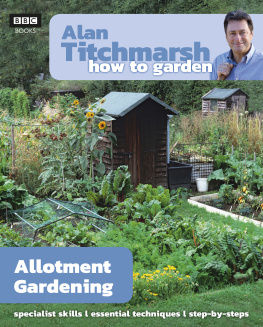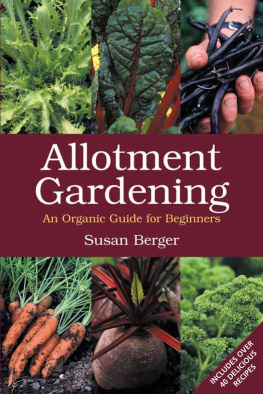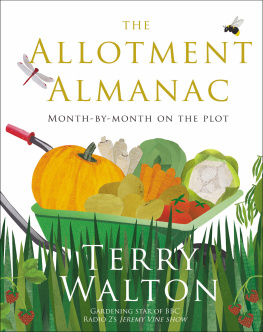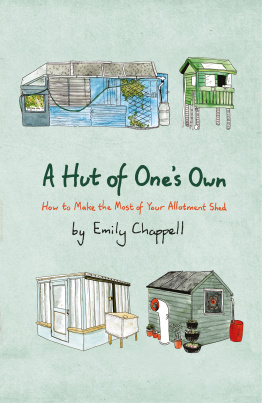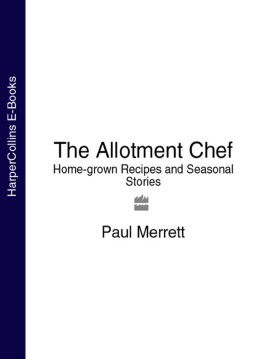I am for ever indebted to John Thompson, who sowed the seed, and Humfrey Hunter, who watered it.
I am also grateful for the assistance provided by David Beasley, Librarian, the Goldsmiths Company.
Bibliography
Lindsey Bareham, A Celebration of Soup (Michael Joseph 1993)
Antonio Carluccio, Antonio Carluccios Vegetables (Headline 2000)
Sam and Sam Clark, Moro East (Ebury Press 2007)
David Crouch and Colin Ward, The Allotment (Faber and Faber 1988; my edition Five Leaves Publications 1997)
Liz Dobbs, The Gardening Which? Guide to Growing Your Own Vegetables (Which? Books 2001)
Fergus Henderson, Nose to Tail Eating (Macmillan 1999)
Dr D. G. Hessayon, The Vegetable & Herb Expert (Expert 2001)
Dick Kitto, Planning the Organic Vegetable Garden (Thorsons 1986)
Joy Larkcom, The Organic Salad Garden (Frances Lincoln 2001)
Felicity Lawrence, Not on the Label (Penguin 2004)
Chris Opperman, Allotment Folk (New Holland 2004)
Anna Pavord, The New Kitchen Garden (Dorling Kindersley 1996)
Michael Pollock (ed.), Royal Horticultural Society, Fruit and Vegetable Gardening (Dorling Kindersley 2002)
Steve Poole, The Allotment Chronicles (Silver Link 2006)
Michael Rand, Close to the Veg (Marlin Press 2005)
Sarah Raven, The Great Vegetable Plot (BBC Books 2005)
The Gardening Year (Readers Digest 1968)
Michael Wale, View from a Shed (Allison & Busby 2006)
In the Beginning
Few things taste better than a dish of new young vegetables, lovingly cooked. No need for meat or apologies.
Jane Grigson, Jane Grigsons Vegetable Book
I can remember with the utmost clarity where I was when the penny dropped. My wife Eliza and I were having dinner with friends in west London, a couple who live in one of those streets that occupy the no mans land between the moderately fashionable (David Cameron is only a few streets away) and the utterly hopeless (the local park is one of those green spaces that seem to have been created solely for the disposal of dog faeces and hypodermic syringes; oh yes, and bombs tooone of the London 21/7 attackers dumped his device there after he lost his nerve). The assembled company included a Guardian columnist and novelist, a museum director, a garden designer, someone from the fashion business and a woman with a frightfully clever-sounding job in the film industry (Mrs Low, as it happens). Then there was me, a journalist on the London Evening Standard , an old-fashioned news man who in his time has reported from the war in Iraq, the tsunami in Thailand and New York in the aftermath of 9/11 (those were the career highs, of course; I would not be giving the full picture if I failed to mention rather less glorious episodes such as the week I spent as a young reporter pursuing Michael Jackson round the streets of London, or the fortieth-anniversary re-enactment of the evacuation of Dunkirk which I chose to mark by passing the entire Channel crossing being sick over the side of a Thames narrow-boat).
Given such company, we should perhapsif we had been acting to typehave spent the evening talking about Damien Hirst, or the new Ken Loach movie; or, if things got really desperate, schools and house prices. But we didnt: we talked about beans. Broad beans, to be precisehow to grow them, when they are going to be ready, and how best to cook them. Not to mention radishes (is there any way to stop the flea beetle eating the leaves?), spinach (how do you prevent it bolting?), tomatoes, courgettes, garlic and potatoes.
The idea that such a collection of people could spend their evening happily talking about the whys and wherefores of vegetable gardening would have seemed extraordinary just a few years ago. Now it is different; now vegetables are cool. Most of us gathered round the dinner table that night wouldnt normally be associated with dirt under the fingernails, but we had all become part of the new urban phenomenon that has seen increasing numbers of people take on allotments or turn their back yards into kitchen gardens as they embrace the joys of growing their own vegetables. Not so long ago having an allotment was definitely a minority pastime, up there with pigeon fancying and whippet racingsomething indulged in by old men who wore flat caps and smoked roll-ups. Now everyone wants to do it. The garden designer and her museum director husband used to have an allotment in London, and now have one in Bath; the Guardian columnist had one down by the Thames, and has since converted his back garden into a vegetable-growing utopia; and as for my wife Eliza and myself, we had just got ourselves one down the road from our house in Shepherds Bush, and were full of the enthusiasm of the newly converted. As gardeners go, we were not completely inexperiencedwe had a few shrubs and flowers growing in the garden, and over the years had managed to raise a few tomatoes in pots outside the back doorbut getting our hands on an allotment had opened our eyes to an exciting new world of vegetable husbandry. No sooner had we got our plot than we discovered how many people we knew were secret allotment-holdersfriends whom we had assumed to be normal, regular members of society but turned out to have a passion for growing their own veg. There was the hairdresser (a fellow mother from our childrens nursery school) and her photographer husband, the book-keeper, the yoga teacher, my cousin Jane and several hacks of my acquaintance. Everywhere I looked there were people who had an allotment, were on the waiting list for an allotment, or at the very least dreamed of getting an allotment. There was no doubt about it: we were on the crest of a Zeitgeist (I dont know if you can actually be on the crest of a Zeitgeist, but if you can, we were there).
The question is: why? Is there actually any point in growing your own vegetables? Isnt it all just a fashionable bit of foolishness, a fad we will all grow out of when the next big thing comes along? Allotment gardening is a tiring, frustrating, bothersome business, where you spend the whole year working your fingers to the bone in the cold and the wet only to find that a malign confederation of slugs, pigeons, blackfly, greenfly, whitefly, caterpillars and light-fingered local vandals has got to your produce before you, and even if you do manage to salvage some of your precious crops, they are usually deformed, discoloured and full of holes. And incredibly dirty. Lets be honest: the stuff in the shops is much better. It is clean, and fresh, and usually comes in a nice plastic packet which tells you which sun-drenched paradise it has been grown in. There are no surreptitious slugs hiding inside the cabbage leaves, like some long-forgotten Japanese soldier who hasnt been told that the war is over, and if you are really lucky someone has been kind enough to trim off all the unsightly bits, so that all you have to do is throw your Kenyan beans into a pan of boiling water, wait a couple of minutes and then eat and enjoy. What could be simpler?
And please dont tell me that you are saving money by growing your own vegetables. Have you seen the price of carrots in your local supermarket? Or potatoes? They practically give the things away. Yes, you might have to fork out a few bob if you want sugar snap peas from Guatemala in the middle of February, but then you wouldnt be eating them at all if it were not for the wonders of air freight. And when you consider the expenses you incur when growing your own vegthe seeds, the tools, the fertilisers (the prices some people charge for manure are a national outrageat that rate its a wonder the horses dont cut out the middle man and start selling it themselves)there is no doubt in my mind that if you manage to save any money at all, it is a pitiably small amount. Then when one takes into account all the work that is involvedwell, the whole thing makes no sense at all. It is madness, pure and simple, and I am going to give it up just as soon as I have got the onions in. And the broad beans, of course: it wouldnt do to miss out on the broad beans. And perhaps it would be fun to have some sugar snap peas again, so lovely and sweet that you have usually eaten the lot before you get home. Then there is the purple sprouting broccoli to consider, and the sweetcorn, not to mention the two varieties of squash I am hoping to try out this year. No, perhaps I wont give it all up quite yet. Ill give it another year.

